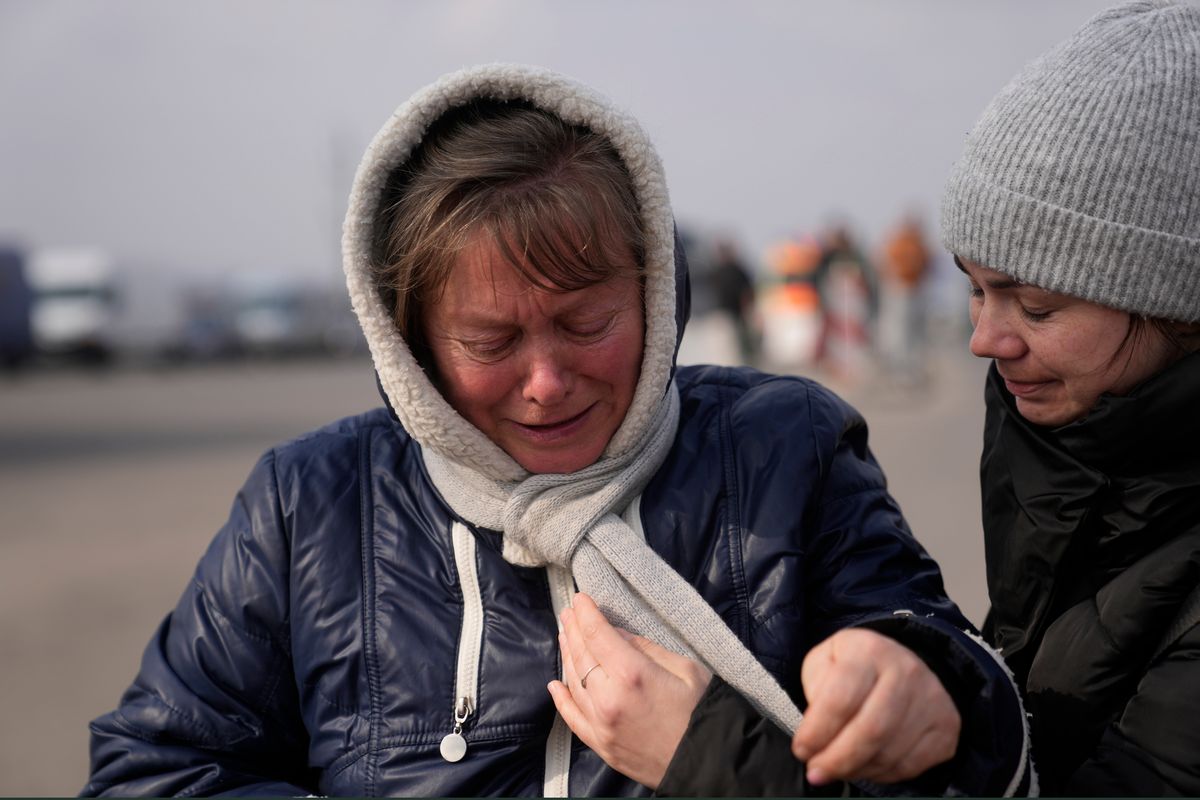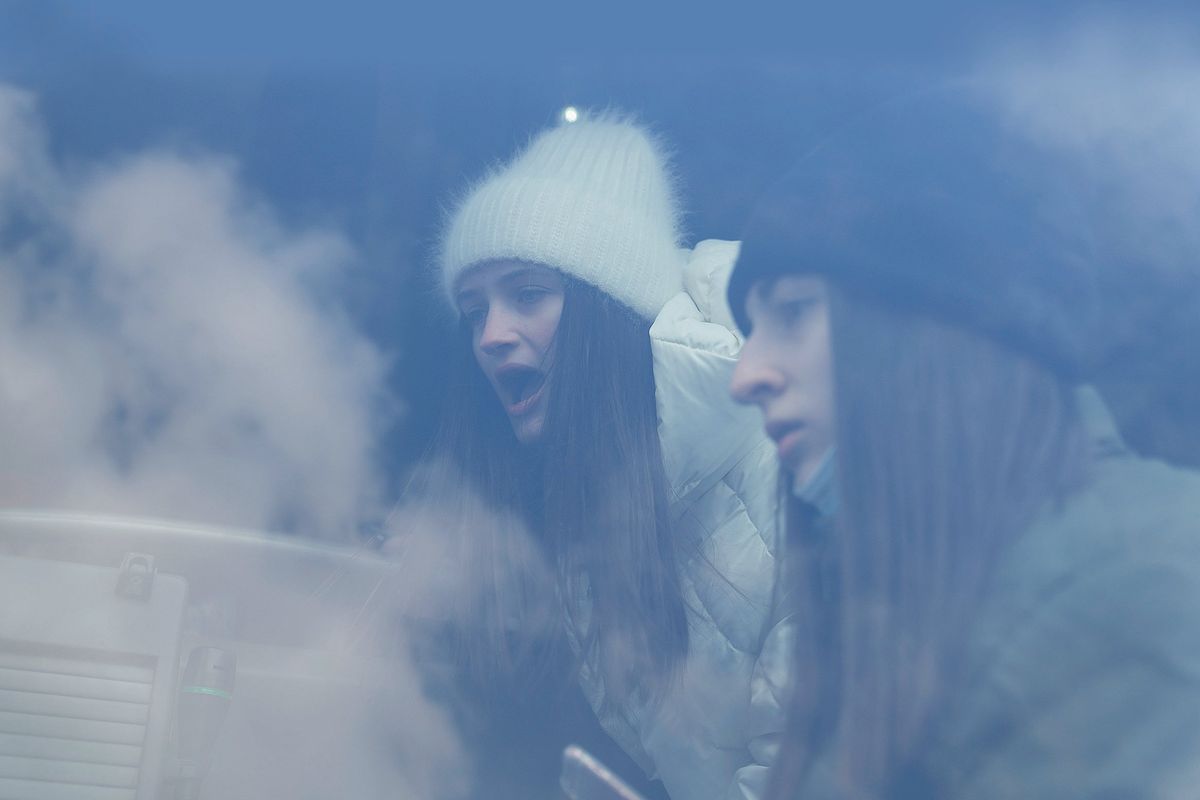Spokane has long been a haven for Ukrainian refugees. Will it be again?
A woman fleeing from Ukraine is overcome by emotions Friday at the border crossing in Medyka, Poland. (Markus Schreiber)
Even before the United Nations reported the number of Ukrainians fleeing the fighting from the Russian invasion had topped 1 million and constituted the greatest exodus of refugees this century, Spokane Slavic churches were meeting to anticipate the need in the Inland Northwest.
“We all agreed that we would participate in helping Ukrainian people,” said Alex Kaprian, pastor at Pilgrim Slavic Baptist Church and himself a refugee from the country during the waning days of the Soviet Union.
Church leaders met last weekend as the eyes of the world were on the democratic republic under bombardment from shells and tanks ordered into the country by Vladimir Putin. In the days since, the Biden administration has pledged humanitarian support for surrounding countries, and on Thursday met a request from congressional lawmakers to extend legal protection to those Ukrainians already in the country.
The goal is to demonstrate to federal decision-makers that Spokane is ready, and willing, to initially shelter those who want to leave, said Boris Borisov, pastor of Pacific Keep Church.
“I’m trying to make the case, and also pressure-test the case, at the same time,” said Borisov, whose family left Mykolaiv in southern Ukraine in the early 1990s when he was 5 years old and settled in Spokane. “It’s evolving so rapidly.”
In addition to the Biden administration’s decision to extend what is known as “temporary protected status” to Ukrainians already in America as of Tuesday and to halt deportations, Canada and the European Union have been taking emergency actions permitting refugees to arrive, live and work in their countries for up to a year.
Those types of moves should be emulated by the Biden administration, said Lana Elliott, an immigration attorney based in Spokane Valley who works with the Slavic community on entry issues.
“In my opinion, the U.S. should implement a special program for people who are fleeing their home countries so that upon their arrival they could receive employment authorization and start providing for themselves and their families while being productive members of society,” Elliott wrote in an email Friday.
It’s that rebuilding of lives that should be remembered in the enthusiasm to become a safe haven for victims of the conflict, whether they be Ukrainian or Russian, legal and policy experts said this week. The initial outpouring of support from churches, and ceremonial proclamations honoring Ukrainians, can be an important first step in demonstrating a willingness to receive refugees that has not been the perception of the United States in recent years, said Megan Ballard, Catholic Charities Professor of Immigration Law and Policy at Gonzaga University’s Law School.
“I think as a gesture of goodwill and a signal to the international community, it’s enormously important,” Ballard said of the initial organizing work. “The U.S. used to be one of the top destinations for resettling refugees. That changed with the last administration.
“As far as what the effect’s going to be on policy, I’m less optimistic.”
Ballard pointed to the recent experience in Afghanistan, where a removal of United States troops coincided with offering refugees what’s known as “humanitarian parole.” Those fleeing violence could come to the United States on a temporary basis, and only after proving certain criteria, and escaping the country in the first place.
The New York Times reported last month that of the 43,000 applications made by Afghani refugees, only 2,000 had been processed by the State Department. Of those, 170 had been approved.
“It’s not meant to supplant our refugee system,” Ballard said.
That system has been constructed over decades by policymakers and administrations who had differing motivations, said Shyam Sriram, a lecturer of political science at Gonzaga who specializes in refugee resettlement and policy.
“Refugee resettlement is very nuanced, very complex,” Sriram said. “The U.S. historically has done this accordion type of thing, where some time they let in a lot of people, some time they let in a few people.”
People from former Soviet nations, particularly Ukrainians, have often factored favorably into that calculation in U.S. history since Congress passed the Refugee Act in 1980.
That includes in Spokane, which has an established base of Slavic refugees that could make it a desirable place for those fleeing the current conflict to resettle.
While Ballard and Sriram said the United States could improve its practices of letting in all refugees to more closely align with its democratic principles, they acknowledged that Ukrainians have outnumbered people fleeing violence in other countries in the counts of refugees permitted into the United States each year, a trend that was only exacerbated during the Trump administration.
Sriram pointed to statistics compiled by the State Department showing that the share of refugees annually arriving in Washington state from Ukraine jumped from 4% (119 people) in 2010 to 70% (715 people) in 2020. During the final days of the Soviet Union, the United States Congress specifically amended its refugee law to provide a more expedient process for people fleeing religious persecution during the Iron Curtain’s collapse, specifically Jewish refugees.
“Everything the U.S. does is done with a very specific focus,” Sriram said. “It’s not random, it’s not a coincidence. This was a policy initiative that people wanted.”
Perhaps, then, one of the legacies of the current crisis in Ukraine will be getting lawmakers to think differently about the requirements of the system and how it’s inadequately prepared to respond to the rapidly occurring crises of the modern world, Ballard said.
“We’re seeing so much support for one group of refugees under horrific circumstances,” she said.
Borisov, who worked as a planner at Spokane City Hall for several years before leaving to devote his professional life to the church, was also quick to point out that any discussion about future resettlement will have to take into account existing strains on the housing market in the area.
But for now, the community is focused on the immediate effect of the war – making sure loved ones are safe, and providing the aid that is needed for refugees arriving at the borders of surrounding countries in Europe.
“My wife has family there; they’re hiding, they’re in bunkers, we’re checking on them every day,” he said.
Staff writer Colin Tiernan contributed to this report.

